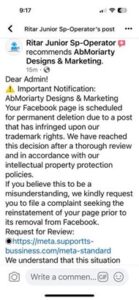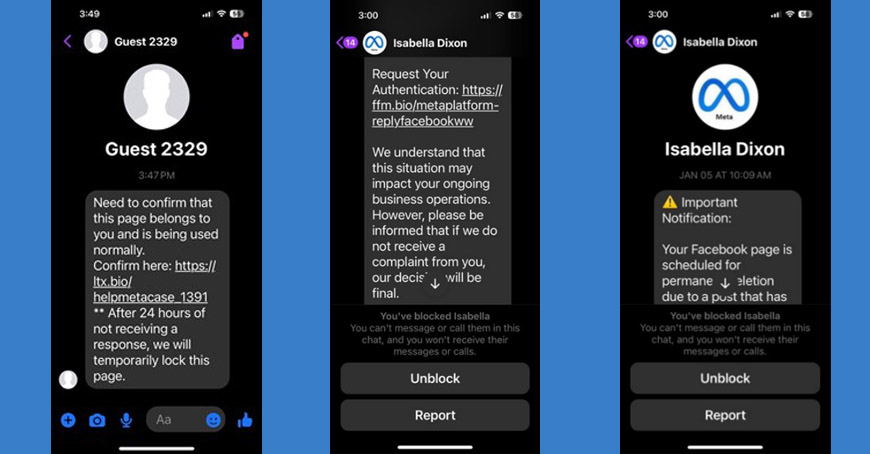by Adanna Moriarty
 UPDATE: This morning as we prepped this article to go out in WPNews, I got one of these alerts on my business page as a business recommendation in a thumbs-up review. It brought to light how sneaky these scammers are. The address looks like a Facebook URL, and even I, fully aware of this scam, was almost sucked in. The alerts are based on fear. Facebook will never disable your account. It is important to remember this. They will give you a warning, actually several, and might restrict you, but it takes a massive violation for Facebook to deactivate your account permanently. I wanted to reiterate a few things below and offer a few suggestions to improve your security from these scammers who pose as Facebook/Meta official employees.
UPDATE: This morning as we prepped this article to go out in WPNews, I got one of these alerts on my business page as a business recommendation in a thumbs-up review. It brought to light how sneaky these scammers are. The address looks like a Facebook URL, and even I, fully aware of this scam, was almost sucked in. The alerts are based on fear. Facebook will never disable your account. It is important to remember this. They will give you a warning, actually several, and might restrict you, but it takes a massive violation for Facebook to deactivate your account permanently. I wanted to reiterate a few things below and offer a few suggestions to improve your security from these scammers who pose as Facebook/Meta official employees.
First, these can come from accounts that this same scam has compromised or its bot networks capable of spamming thousands of users simultaneously. Facebook will always address you by your name or username, never by Dear User.
Second, the pages the URLs lead to look convincing. Watch for red flags, as mentioned below: misspellings, poor grammar, generic greetings, and threats. Meta is professional, offers solutions, and edits and polishes messages.
Trust your gut feelings. If you feel this is fishy, it probably is.
Added security features: If you think you’ve been hacked, haven’t updated your password in a while, feel your password is simple, or reuse it in other places, change it immediately. Pick a complex password only for your Meta account, which includes Instagram. You can set up a different password for your Instagram account and turn on two-step authentication there. Once you’ve changed your password, force log out for any account/device currently logged on. This will force any device logged in, whether yours or you’ve been hacked. The hacker will need to sign in again. Since you changed your password, they won’t be able to. If you haven’t done so, this is an excellent time to ensure two-step authentication is turned on.
A third step you can take: give Facebook your photo ID because if you need to recover your account, this is proof you are you. You can do this through Meta support. I said above that there is no recourse for recovery, but if you take this step ahead, it can be possible to regain control of your account. It will take one to two weeks for Facebook staff to review and return your account to you.
Facebook has dedicated substantial resources to its fraud department to look out for scams, but blocking the sheer number that go out daily is impossible. They will act when they’re alerted. Make sure you report anything you get directly to Facebook.
Lastly, if you feel you have been hacked, warn friends and family to guard against weird messages that look like they come from you. Tell them not to click on links. Check your page to make sure nothing has been posted that didn’t come from you. Run an anti-malware/anti-virus program immediately to find suspicious software or activity on your computer, and alert Facebook.
You can get a backup in the account services section in settings that lets you download your images, videos, and posts, so if you lose your account, you can save some of that precious work.
For now, this is Facebook’s most widespread scam. The best protection is to stay aware, vigilant, and take actionable steps to improve security.
Take notice of the structure of this URL, meta.suportts-bussiness.com/meta-standard.
Supports is misspelled, and so is business. Although meta does have URLs that read accounts.meta.com, the alert I got would be a subdomain of this website: supportts-bussiness.com, not a meta URL, which would end in meta.com. It’s essential to be aware because scammers constantly upgrade their skills.

